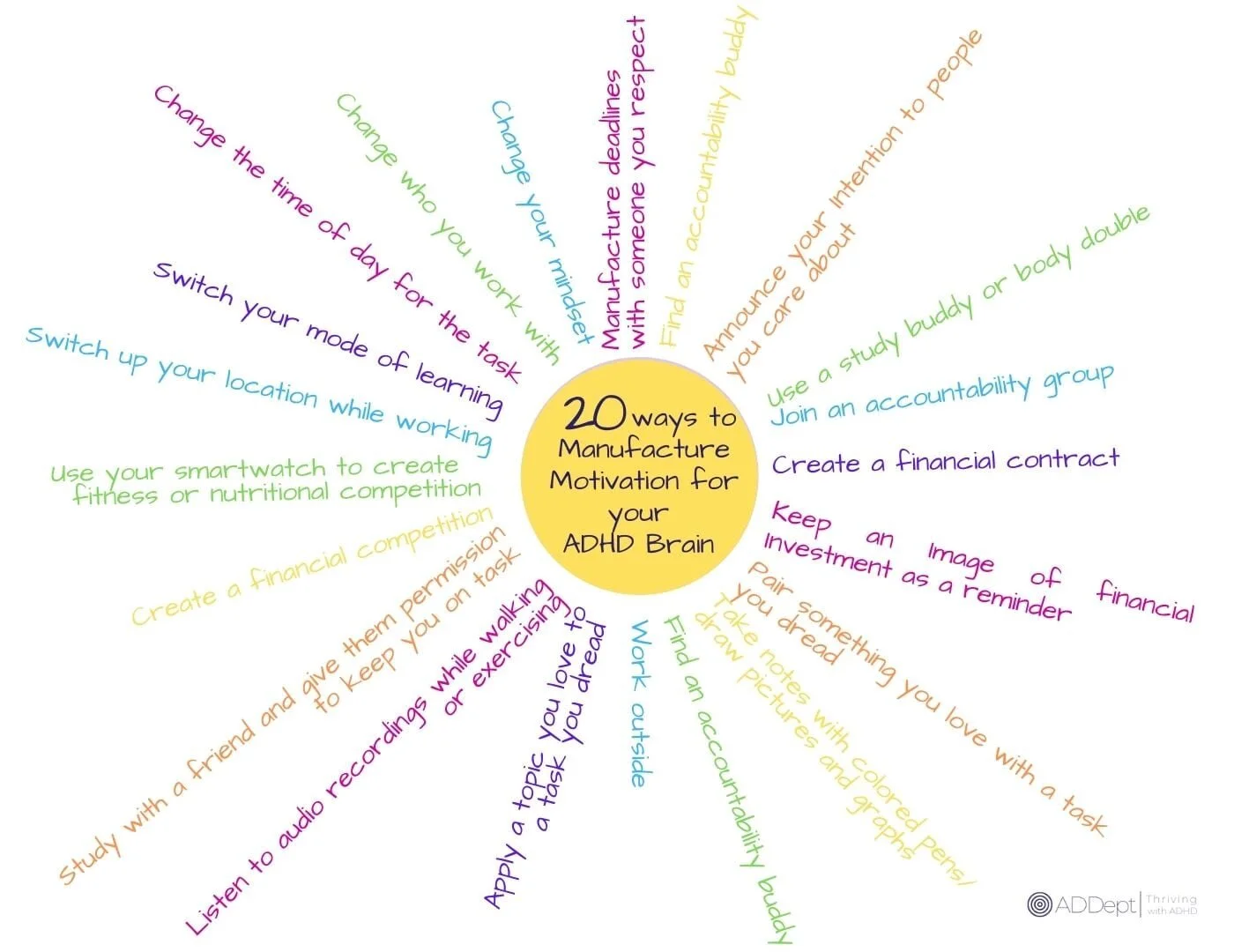It's a Tuesday, and you have a massive report due next Friday. This is the one that stands between you and the promotion you have been working towards for the past 3 years. You know it is essential, you know you want extra time so that you can edit it and polish it before you turn it in and you know you really SHOULD start it today.
But you JUST. CAN'T. GET. STARTED.
It’s as if your brain is staring up at a 2-story wall, with the project on the other side. It knows it needs to get to the other side but feels powerless to scale it.
So what's an ADHD brain to do? It needs a push, a leg up (or maybe a sturdy ladder), and a huge amount of energy to get over that initiation hurdle. How does it find that energy?
Manufactured motivation.
This is where understanding what motivates you and your ADHD brain comes in handy because you can leverage the 4 pillars of motivation: novelty, interest, competition, and pressure, to get yourself into action. So let's explore some of the possible ways of using the unique ADD / ADHD motivators to your advantage.
20 Sure-Fire ways to Manufacture Motivation when your ADHD Brain’s got nothing.
Using Pressure
Manufacture deadlines
Deadlines almost always provide momentum to cross the hurdle of initiation. The downside of waiting for the natural deadline pressure is it usually only allows enough time for the bare minimum to get done. It doesn't allow for finesse, polishing, editing, etc.
To provide the time to get done what you really WANT to do, manufacture deadlines becomes your best friend.
But just telling yourself that something is due 3 days before it really is won’t work- your brain knows that's just a trick. Asking someone you really respect, however- someone you don't want to disappoint-- to read/ listen/ look at a piece of your report a few days before it is due (make sure you schedule the exact time and the exact thing that you’ll give them)- this creates an artificial deadline in advance of your due date and a little extra feedback
Get skin in the game
As human beings, we don't like to lose money. So putting some cash on your action can help provide the pressure needed to get moving.
Create financial contracts- For example: try writing a check to an organization you are opposed to and give it to a friend, if you haven't completed the task by a specific date- they mail the check.
Pay for a course or service that you really want to complete- keep the check or the amount of money you paid on your desk to remind yourself of the investment you have made.
It is important to note- between late fees, finance charges, and missed amazon returns- people with ADHD are pretty used to losing small amounts of money. So, the only financial pressure that is really going to have a substantial effect on your brain is going to be a big one. Think about how much money hurts for you- it will be different for everyone. This isn't just a "bummer, I wish I didn't have to pay that" but instead it is a "wow, I'm going to have to sacrifice something to pay that."
Using Interest
Interest can feel like a hard one to manufacture- some tasks need to be done, but they just really hold no interest (taxes- here's looking at you). So you may not be able to create intrinsic interest in the task itself, but you can add interesting tasks to it. For example:
Like being outside?
Try work in a quiet courtyard on a beautiful day
Like art and design?
Take notes with colored pens, make it look pretty
Are you really social?
Work with a study buddy (who knows the rules around chatting and distracting and will easily hold you to them)
Is there a way to pair the task with a topic you love?
For example: Studying business strategy? Apply what you are learning to a brand you love or a hobby you adore
Listen to the book you need to read on audible while running or walking
Competition
Some people with ADD / ADHD really respond well to competition. It gets a fire under them when they have the opportunity to prove themselves. If you are that person- use it! For example:
Create a financial competition with a friend- you both put in a (not insignificant) amount of money and agree to a deadline for respective projects- whoever completes the project in time gets the money
Use your smartwatch or smartphone to create competitions for exercise, movement, or nutrition goals
Use goals such as races or business development competitions to get you moving
Novelty
A new task is so much easier to start than the one that’s 70% completed. It still has all the shiny newness of promise and possibility. But if we only work on a new thing, then we end up with a pile of half-finished tasks. So, when you can't make the task itself novel, make your setting, method, or environment fresh and exciting. For example:
Switch up your location while working:
Try tethering to your phone's internet and go work in a park on a beautiful day
If you can't leave your office, try working in the conference room for a few hours
Switch between a few different coffee shops or libraries during a work from home day
Switch up the mode of learning- listen to audiobooks or podcasts, read physical books, take notes, talk through new ideas with a colleague
Change your mindset- if you can't change anything else related to the task, take a break, walk away and come back to it fresh- think about what can you learn from this batch of work that is different from the last, what new way can you engage in the task?
Change who you work with- bring in fresh ideas and perspectives. Or just a fresh person sitting beside you.
Change the time of day you do a task- doing typical evening tasks first thing or reserving mid-morning tasks for early evening.
Have a task on the horizon that needs to get done but holds no natural motivation? Think through the things that naturally turn your brain on. What is it that really gets you moving and over those huge hurdles? Is it pressure, novelty, competition, or interest?
This is your strongest personal motivator. This is what you want to start with when manufacturing motivation. In what ways can you use your motivating factors to create the push to get you going? What can you do to keep the ball rolling through to completion? Play around with a bunch of them, mix and match or try a few all at the same time. They may not all work to the same degree each time but keep working with them and you’ll find some real motivation mojo before you know it!
What is your favorite trick for creating motivation? Share them in the comments!
Ready to shift from
meltdown to mastery?
This online course has been designed specifically to help teach the strategies ADHD brains need to help them move from overwhelm and meltdowns to confident emotional mastery.
Want to know more about
thriving with ADHD?
Check out these other articles:











The 5 things proven to motivate ADHD brains